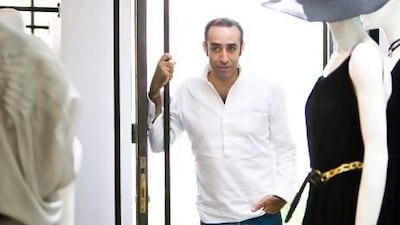Tala Hajjar is frustrated, annoyed by what she sees as the cultural massacre perpetuated almost every day in the marketing of her country.
"I struggle to sit back and watch the mainstream take over," says the 34-year-old director of Starch, a design collective she founded with the internationally feted Lebanese fashion designer Rabih Kayrouz that incubates local creative talent with a combination of mentoring and communication guidance.
She sighs and spoons the foam on her cappuccino. "But then I ask myself 'why should we impose our sense of aesthetic on the majority? Who is to say we are right?'"
In an absolute sense she has a point. But what if one could argue that a particular "aesthetic", or indeed the promotion of Lebanese talent, could lead to quantifiable economic growth? What then?
It is an idea to which Ms Hajjar is sincerely wedded. "In 2011, I asked the ministries of tourism and culture why they didn't highlight our growing design industry as much as our entertainment sector," she recalls. "An adviser admitted that short-term income was what was needed, even if it meant focusing on Lebanon's nightlife."
Indeed, one only has to recall CNN's ubiquitous Richard Quest barking his way from throbbing rooftop bar to throbbing rooftop bar to appreciate just how much Lebanon's considerable internationally recognised talent - Nada Debs, Rana Sam, Johnny Farah, Karen Cherkerdjian and Mr Kayrouz among many others - has been eclipsed by the food, shopping, shisha and spa culture that Lebanon peddles with apparently endless gusto.
"They have reduced our culture to images of women getting Botox. Our international marketing is a shameful," Ms Hajjar says.
Among her other bugbears are the uniforms worn by Middle East Airlines cabin crew. And the glowing coals of frustration were poked once again after the announcement that Virgin Airlines had agreed to collaborate with Vivienne Westwoodon a new look for the carrier's staff.
"I mean why can't MEA do the same thing? Why can't it take pride in our home-grown talent and put out a tender for [new] uniforms. I am certain our best designers would jump at the chance to inject a bit of class back into our national carrier and I'm sure the stewardesses would carry themselves better," she says.
MEA would be taken on to the catwalk and applauded for its vision if it went with a local designer. But the airline exists in a murky world, structured and run by political and sectarian cliques and overseen by a draconian central bank. As long as it remains in state control, it is unlikely that the carrier will have the daring to take its brand either into the 21st century or the pages of Monocle magazine.
You might think that Ms Hajjar sounds like a screaming, not to mention bitter, harpy. Nothing could be farther from the truth. Petite, blonde, understated and thoroughly likeable, she admits to an innate optimism and recognises that change cannot happen overnight. She talks of "baby steps" and the need for a unified effort by those who care deeply enough to take action.
Starch has no budget. Ms Hajjar and Mr Kayrouz, who mentors the designers, give of their time, while the premises in the downtown enclave of Saifi Village has been given free by the property giant Solidere, a remarkable gesture from a company with a reputation for putting its bottom line before all else.
Ms Hajjar also wants Beirut Duty Free to be more adventurous with what it offers to travellers. "If they can sell nuts, baklava, Lebanese wine and arak, then why not have a shop selling accessories from our top designers that are small enough to put in hand baggage? You have a captive customer base, many of whom are desperate to buy a decent present."
Ms Hajjar says she took her idea to the management of Beirut Duty Free, who promised to get back to her. "They loved it. But then I heard nothing." she sighs. "Still, like I said. We need to take baby steps."
Michael Karam is a freelance writer based in Beirut

Lebanese fashion deserves its place on a wider stage
Lebanese fashion designer Rabih Kayrouz, who incubates local creative talent argues for better marketing of it fashion and accessories.
Most popular today
